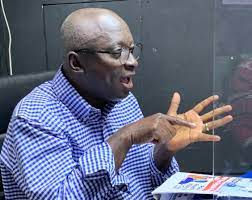Samuel Atta Akyea, lead defense counsel for former National Signals Bureau Director Kwabena Adu Boahene, has justified his dramatic courtroom walkout on Thursday, October 23, explaining that continuing the trial while a Supreme Court bias allegation remains unresolved would undermine justice. The veteran lawyer’s decision sparked immediate controversy, with Justice Eugene Nyadu Nyantei formally noting that defense counsel had “abandoned” the proceedings.
Speaking to journalists after leaving the High Court in Accra, Atta Akyea insisted his team had no choice. They’d filed a prohibition motion at the Supreme Court on Wednesday, October 22, seeking to bar Justice Nyantei from presiding over the case due to alleged bias. When the trial judge declined to pause proceedings until that application could be determined, Atta Akyea said continuing would compromise his client’s constitutional right to a fair trial.
The sequence of events reveals a deepening standoff between the defense team and the court. After Justice Nyantei ruled that proceedings would continue with the second prosecution witness, Atta Akyea formally requested permission to leave. The judge refused and insisted the trial proceed. At that point, Atta Akyea and his colleagues gathered their materials and walked out while the prosecution’s Finance Director witness prepared to testify.
Justice Nyantei’s response was swift and unequivocal. He ordered that court records reflect the defense team’s departure as an abandonment of proceedings, then instructed Adu Boahene to either recall his lawyers or represent himself. The court took a brief recess, and when it resumed, Adu Boahene reported he couldn’t reach his legal team. Only then did Justice Nyantei grant an adjournment, setting October 30 for continuation.
The legal reasoning behind the judge’s decision is worth examining. In his ruling, Justice Nyantei emphasized that adjournments rest entirely within the trial court’s discretion. He argued that no miscarriage of justice would occur because the Supreme Court hasn’t yet made findings on the bias allegations. More significantly, he reasoned that if the Supreme Court eventually rules in the defense’s favor and identifies improprieties, consequential orders can correct any wrongs retroactively.
That logic, however, is precisely what the defense finds problematic. From their perspective, asking them to proceed while simultaneously alleging the judge is biased creates an impossible situation. How can they mount an effective defense before a judge they’ve publicly accused of prejudice? And what happens to testimony given and rulings made if the Supreme Court later agrees bias existed?
This isn’t the first time Adu Boahene’s defense team has clashed with the court over procedural issues. Back in September, they unsuccessfully sought access to what they described as material and exculpatory documents. When Justice Nyantei denied that request, they appealed and asked for a stay of proceedings. That application was also refused on October 17, setting the stage for this latest confrontation.
The stakes extend beyond courtroom procedure. Adu Boahene faces serious charges alongside his wife Angela Adjei Boateng and others, including stealing, money laundering involving approximately GH¢49.1 million, willfully causing financial loss to the state, and abuse of public office. The prosecution alleges funds were diverted from state accounts to private entities. A third accused person, Mildred Donkor, has since become a prosecution witness after charges against her were withdrawn, potentially strengthening the state’s case.
For Atta Akyea, this appears to be a calculated strategic move rather than an impulsive reaction. By walking out, he’s forced the Supreme Court’s hand on the bias allegation while creating a clear record of his objection. If the Supreme Court sides with him, the dramatic exit becomes vindication. If not, he’s established grounds for future appeals based on the denial of fair trial rights.
The October 30 continuation date now carries additional weight. It’s unclear whether the Supreme Court will rule on the prohibition motion before then, or whether the defense team will return if that ruling goes against them. What is certain is that this case has become a test of judicial authority, with both the trial judge and defense counsel drawing lines neither seems willing to cross.
Source: newsghana.com.gh











